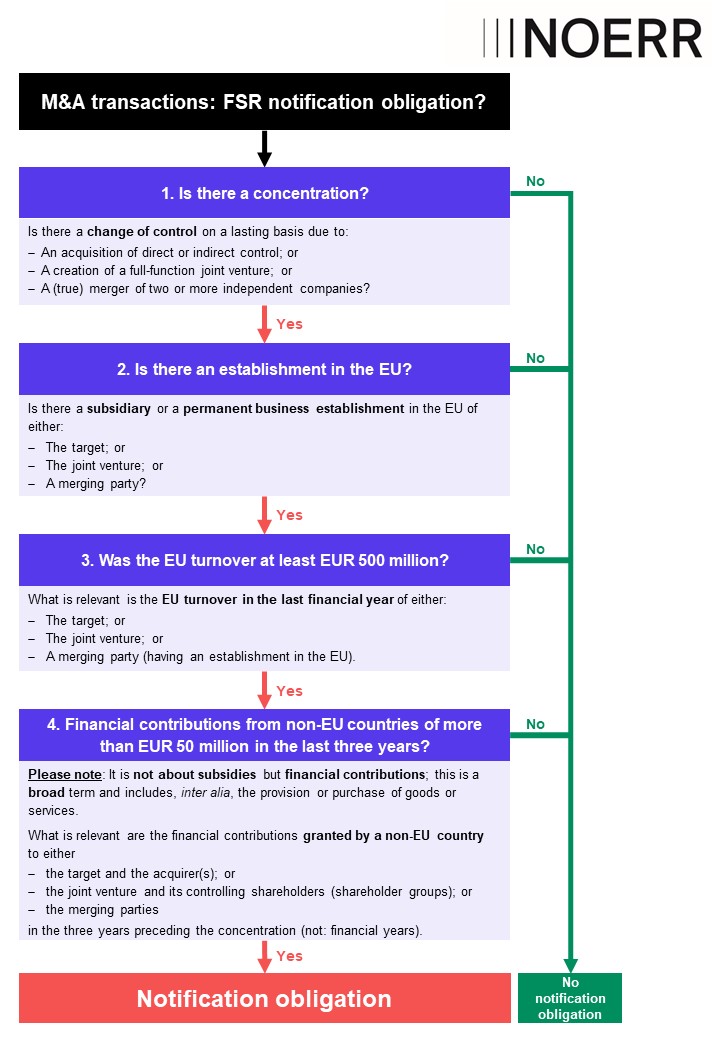Foreign Subsidies Regulation: Initial experience, new “State aid” developments
The new Foreign Subsidies Regulation (“FSR”) has been fully applicable for a few months now. It allows the European Commission (“Commission”) to investigate foreign subsidies and potential distortions in the internal market. The three tools created for this purpose (M&A transaction tool, public procurement tool and ex officio investigation tool) are described in more detail in our previous article here.
According to the latest statements by the Commission, so far up to ten transactions have been “cleared” and another 50 transactions are pending as part of pre-notification contacts with and notifications to the Commission. These first use cases provide initial insights and show new structural developments.
A new Foreign Subsidies Directorate under EU State aid law leadership
Unsurprisingly, effective enforcement of the FSR requires a great amount of personnel resources at the Commission. When the FSR came into force, the Commission announced at the request of the Directorate-General for Competition responsible that it would gradually increase staff numbers and create new structures. Initially, plans were made for around 120 additional officials. However, the details remained quite vague.
Now first specific plans have been revealed: A new “Directorate K” will be established within the Directorate-General for Competition in the next few weeks. The new Directorate K will have three separate units and will assume investigative powers from 1 March 2024. It will be under the leadership of the experienced State aid Director Karl Soukup.
Karl Soukup will hold his new position in addition to his current position as Director of the State aid Directorate H until further notice. He will be assisted by numerous other officials who were previously responsible for EU State aid law and international relations. The previous FSR task force will be integrated into one of the three units of the new Directorate K.
EU State aid law instead of “merger control 2.0”
The structure of the new Directorate K and its staffing reflect what has already become apparent in the first few months of the FSR's application: Investigating foreign subsidies that distort the internal market is and remains a matter that is deeply influenced by EU State aid law.
From the very beginning, the aim of the FSR was to subject foreign subsidies to rules similar to those that have applied to State aid by Member States for over 60 years. Due to globalisation and the greater opening up of the European economy, the control of State aid by Member States alone was no longer considered adequate to ensure fair competition in the EU’s internal market.
Accordingly, the M&A transaction tool does not just serve as a type of “merger control 2.0”, despite formal parallels. The material, substantive control of M&A transactions – and thus the questions of risk assessment, the best strategic positioning and even the “probability of clearance” – follows its own standards. Both principles and practical experience from EU State aid law provide the required substantial guidance.
To file or not to file?
The new M&A transaction tool still causes some uncertainty, although an FSR notification obligation can often be clarified by answering just a few questions. This is illustrated by the following flowchart (for an enlarged version, please click on the thumbnail image or here (pdf)):
Disclaimer: This generic flowchart does not claim to be exhaustive and cannot replace individual legal advice to clarify an FSR notification obligation in individual cases.
Our Noerr Competence Team of experienced experts in the field of FSR, EU State aid law and merger control will be happy to answer your questions and assist you. You can also sign up here to receive all our news alerts about the FSR.
Well
informed
Subscribe to our newsletter now to stay up to date on the latest developments.
Subscribe now











